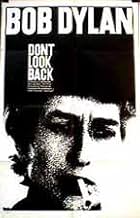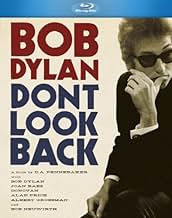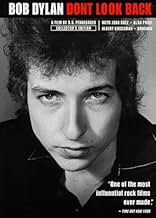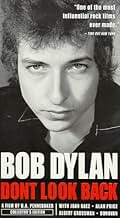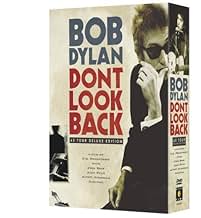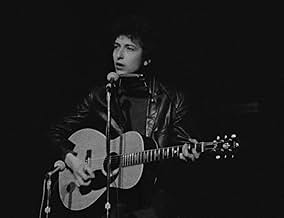Documentario che copre il tour di Bob Dylan in Inghilterra del 1965, che include apparizioni di Joan Baez e Donovan.Documentario che copre il tour di Bob Dylan in Inghilterra del 1965, che include apparizioni di Joan Baez e Donovan.Documentario che copre il tour di Bob Dylan in Inghilterra del 1965, che include apparizioni di Joan Baez e Donovan.
- Regia
- Sceneggiatura
- Star
- Premi
- 4 vittorie totali
- Self
- (non citato nei titoli originali)
- Self - science student
- (non citato nei titoli originali)
- Self
- (non citato nei titoli originali)
- Self
- (non citato nei titoli originali)
- Self
- (non citato nei titoli originali)
- Self
- (non citato nei titoli originali)
Recensioni in evidenza
a term used to describe films that looked as if they were happening in real time. This is one of those films. It is a gritty black and white documentary that follows the legendary Bob Dylan during a tour in England. This is not a conventional rock documentary where we are shown endless concert footage and interviews with musicians talking about their philosophies and the meanings of their songs. Instead, the camera follows Dylan in a frenzy capturing every detail of social interaction with his fans, entourage, and the press. Dylan appears arrogant but it is no surprise when Pennebaker allows us to see the hypocrisy and greed of the outside world. A memorable moment in the film involves a fan whose invited himself backstage to meet Bob Dylan. He asks him absurd questions such as "what is your attitude on life?" Dylan decides to tease him and the conversation gets pretty ugly. Nevertheless, it is an important scene to the film because it shows us how difficult it is for a superstar such a Dylan to keep a smile and act nice to everyone. Do we gain sympathy for Dylan? We do because we see how alienated he feels among even his closest friends. We also feel a sense of envy for his ability to be so unapologetic and rebellious about his attitude. He is honest but he also has to protect himself from the public. After a Time magazine reporter asks him whether or not he cares what he's saying . Dylan attacks him and then tries to give him a straight answer . "Do you think anyone who comes to these concerts is looking for anything other then entertainment?" The next day, Dylan hears a quote from the papers that describes him as an anarchist. The sequence of these events show clearly how Dylan is at a loss with the public's perception of him. He can't just be himself. He wants to come across as a guy like anyone else but his sarcastic and meaningless interaction with the press only makes things worse. The film also includes appearances with Joan Baez, Donovan, Allen Ginsberg, and Dylan's sleazy manager Albert Grossman. I've seen this film dozens of times and I still see something new with every viewing. It is a true masterpiece.
In other words, this is not a portrait of the artist that I happen to like, but it is the truth (or at least it was at that time). In addition, Albert Grossman, Dylan's manager, is shown in possibly the least flattering light possible. A bonus is that the film begins with the brilliant 1965 promotional clip for "Subterranean Homesick Blues", and watch for the scene in a hotel room when Dylan and Bob Neuwirth sing "Lost Highway" - it's worth the price of admission.
Right from the start you can tell Dylan is sick of being on tour, either that ir he's sick of people(note how he rolls his eyes in the very beginning when he explains to a woman why he's carrying a lightbulb) so we become accustomed to the way he answers questions; sometimes rude but always originally, many times hilariously. He was afterall, still a very young guy in a foreign country. It didn't matter how he spoke with people, though, because he communicated enough-as we can see in Don't Look Back through his music.
When you watch him play, it's amazing to see the stillness in the audience, the entranced eyes, fixed in concentration, minds in fear that they may miss a word of one of Dylan's songs. I love how, right at the beginning when he gets asked "When did you know you wanted to become a performer?" and he seems to think for a minute...and it cuts to: Dylan about 6-8 years prior..playing in a field surrounded by a bunch of African Americans...seemingly singing about (an)African-American...and when the camera pans close to his face, you can see tears rolling down his cheeks! It made me cry...........
The good thing about it is you see a little bit of everything...Dylan on stage in his element, Dylan f*ked up;), w/his pals, p***ed off, and Englanders...
We also get to see a very young Joan Baez( whose voice I had never even heard before watching this)- an innocent, beautiful woman who despite this had morals and a voice that would also be heard....like Dylan she was way ahead of her time.
In short, I cannot say enough about this documentary-it gets better everytime I see it, and I don't say that about a lot. I still cannot hear enough of his music or his lyrics...
Long live Dylan and Baez... -Heidi
The whole movie focuses on Dylan and has a constant influx of other characters. We see the press, fans, his manager, and other business people. Throughout the movie, we never really know whom those people are, making the movie completely about Bob Dylan and his life. These other people are merely characters in his life, but he is the real important person. D.A. Pennebaker, the documentarian, is never a character either, showing that the movie is all about Dylan and not about the other people around. This allows for a deeper understanding of the singer and lets the audience see who he is for themselves, without riddling their opinion with interviews with other people.
D.A. Pennebaker has an artistic flair for music and introducing people to the deeper meaning in it. He has done other works about John Lennon, Jerry Lewis, and Jimi Hendrix. This shows that he understands the music genre and it is a place that he has delved many times. He is known for having the direct cinema style to his work. He just allows the camera to roll and it is a natural and true look at what is going on with the people he is documenting. The whole movie is an easy flow of life, combining scenes of travel and life on the road with songs of Dylan's to capture to true mood of the tour. The music is key because to truly understand Bob Dylan, you must understand the music. He writes very personal music and by using that in the documentary we are able to gain a better understanding of the man himself. Even those that go to see him understand that his music is important and something that is changing people and the way people think. So to have all the music be Dylan's allows the viewer to understand both Dylan and the impact that he had on the people during his tour. The editing of the film is consistent with the direct cinema style. There are no real cut aways or a narrator; rather there are sequences of people talking all together that then go into Dylan playing. Whenever music is being played, there is no interview or audio being used over it, it is just Dylan playing in concert or with his group of friends. Because it was edited this way we are able to hear the music and realize how important it is to the film and to the life of Bob Dylan. It is edited to seem as one constant period of time; we never see the real change as time goes on. The tour continues but it is never edited to seem as though things change from place to place. The great editing combines with the interesting cinematography that Pennebaker uses in the documentary. The film was done all in black and white and has a mix of shots that were used. The black and white is generally grainy with a balance of black and white. Pennebaker shoots the time backstage, in hotels, and in concert as if we are there. It is as if we are naturally sitting there with Dylan and all of his managers and others that tour with him. There are close up shots that show Dylan playing either on stage or behind the scenes and this gives the viewer the sense of how much he thinks and works on his songs. Most of the camera work is very controlled, though there are times where they are walking backstage, or trying to escape from a concert hall that the camera is very shaky. However, the shaky camera work allows the viewer to feel as if we are part of the tour and that we are there with them. Overall, the film Don't Look Back shows a side of Bob Dylan that most are unable to see. We see the person behind the songs and are able to understand Dylan as a person. We see that he is somewhat cocky about himself and tends to want things done his own way. We see all the chaos that follows touring as a famous star and how someone like Dylan deals with that. He is outspoken and passionate about what he believes. Pennebaker is able to give us this in depth look at Dylan and let the fans become more a part of the artist. It is a great look at Dylan and frames his life and music in a way that makes it more accessible and understandable to the general public. Looking back now, over 40 years later, we can see how Dylan started and translate that into his fame that continues today. We can see why he is one of the best artists of our time.
Lo sapevi?
- QuizThe scene where Donovan visits Dylan in his hotel was generally viewed as Dylan putting the young singer-songwriter in his place when he grabs the guitar and performs "It's All Over Now, Baby Blue." But a 2015 Criterion Collection remaster, with improved sound, revealed that Donovan actually requested Dylan play that song for him. That gave the entire scene a new meaning and revealed Dylan and Donovan as more friends than rivals.
- Citazioni
Albert Grossman: They've started calling you an anarchist.
Bob Dylan: Who?
Albert Grossman: The papers. That's the word now.
Bob Dylan: Anarchist?
Albert Grossman: Right. Yeah.
Bob Dylan: The newspaper's say I'm an anarchist?
Albert Grossman: Two or three. Just because you don't offer any solutions.
Bob Dylan: You're kidding!
Albert Grossman: Of course.
Bob Dylan: Anarchist? Huh? Give me a cigarette. Give the anarchist a cigarette. Anarchist? A singer such as I.
- ConnessioniFeatured in Precious Images (1986)
I più visti
- How long is Bob Dylan: Dont Look Back?Powered by Alexa
Dettagli
Botteghino
- Lordo in tutto il mondo
- 934 USD
- Tempo di esecuzione
- 1h 36min(96 min)
- Colore
- Mix di suoni
- Proporzioni
- 1.37 : 1


